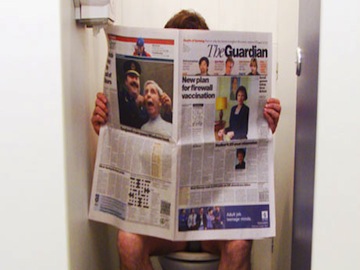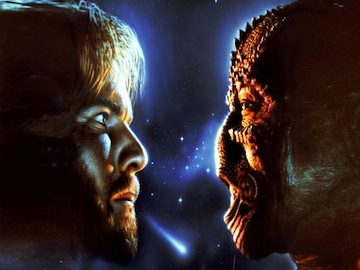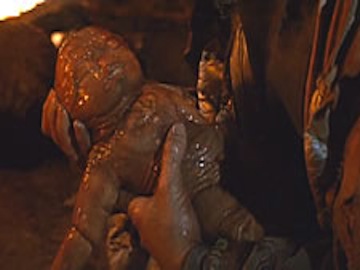I GREW UP in a family where a particularly Neanderthalic rendition of manhood reigned supreme. My father, a balding East Coast transplant from working class roots with a James Gandolfini frame, matted fur back, and Tony Orlando moustache, ruled my brother’s and my childhood with a hairy Massachusetts fist. My mother, a fair and intelligent woman from a wealthy Boston suburb, never stood a chance, and neither, obviously, did her two sons, cowering before this mountain of purpose, this alpha wolf sitting atop the pride rock of his newly wrought suburban Colorado home with eyes that shone through our most hidden intentions.
Like my mother, I approached existence with a gentler outlook, never able to understand, even as a small child, the constantly imploding pragmatism my father took to daily life. Stomping around the house shirtless in Spandex shorts like the burly general of an army of New Jersey gym rats, he set his sights on impossible tasks, things that perhaps applied to children scrounging for scrap metal in 1942, but not to hypersensitive youths who’d just skirted the solipsistic coke binge of the eighties and were surrounding themselves with disaffect.
It comes as no surprise then that my father was not what you’d call a ‘thinking man.’ His tastes, at least during my formative years, were blue collar and libidinal. Although he was good at his job and provoked rapid and prolonged success from those dealings, he did so through practiced hardheadedness and bellicosity. Pretension in any shape or form inveigled him, and he once told me, when he noticed I had become a quiet, bookish youth with a weight problem and friends who played Magic the Gathering as opposed to football, “Why would I read anything but the newspaper? If it’s not happening now, it’s not important.”
Over the years, my father became an object of intense, almost scientific, interest to me. Perhaps because we were so different, I found myself tracking his every whim as a naturalist might track the migratory habits of wild boar. In many ways, it gave me a sense of power—even superiority. I’d come from him, yes, but wasn’t sure quite how, and relished the manner in which I could pick out the differences, the unknown ubiquities that had formulated his person. He was slow to evolve, easy to anger. He wasn’t someone with whom you could respectively disagree. The neighborhood children were truly terrified of him as a result of his tackling a group of doorbell ditchers who ran from our home one November night after they targeted us for a trick. Even now I can remember screams in the streets–my father, shirtless, teeth gnashed, holding two twelve-year-olds by the waist of their jeans to the full prairie moon, growling, “You’re fucked now!” That was him. The strongman, the rankled. The sports enthusiast and hoster of late night poker games filled with members of a Denver synagogue my mother had forced him to join. The man whose ancestry I attempted to disown for many, socially humiliating years.
As I grew, however, I began to learn that you are never utterly independent from that which begets you. No matter whether you’re near or close, one’s parents are the source of your pathology, your wants and needs and interests. I don’t mean to simplify human psychology (I know next to nothing about it) but you really can’t escape the constraints of those who raised you. And in all honesty you probably shouldn’t. In my father’s case in particular, I came upon something that changed the very course of our relationship, rendering it civil to this day. While the man avoided books with concerted effort and treated complex emotional conundrums with the classic ‘Hulk SMASH!’ approach, I ended up discovering we had something in common. My father, the anti-intellectual, the man who worked in a steel mill right out of high school until my mother made him enroll in college under threat of terminating their relationship, had an obsession with abstract science fiction and horror films.
Dune, Blade Runner, Carrie—you name it. If it wasn’t of this world, he ate it right up. And then there was Enemy Mine, which was (and still is) his favorite of them all. Ever since the first time he saw Wolfgang Petersen’s epic hit the screen, he couldn’t stop shaking his head in awe, saying, “Enemy Mine. Now that’s a good movie. The best movie ever.”
He rented it twenty times.
For those who haven’t heard of this 1985 box office flop, it’s a space drama, a rather sentimental one, in which the humans—typified by main character Willis E. Davidge, played by Dennis Quaid—are at interstellar war with a reptilian humanoid species called the Dracs. Quaid, whose character is a fairly well drawn if anachronistic amalgam of white America in the 80s, ends up enmeshed in a battle with a Drac starship piloted by co-star Jeriba Shigan (Louis Gosset, Jr.). When things go awry during the first few minutes of their melee, the two crash land on Fyrine IV, a somewhat bare and hostile alien world where they are abandoned by their own kind. The next 108 melancholy minutes are spent with them learning each other’s cultures and discovering how to cooperate and not hate the nefarious ‘other.’ This leads, eventually, to the birth of Jeriba’s child (Drac are asexual and self-reproduce), and Jeriba’s subsequent and somewhat mysterious death from delivery. Willis then takes the Drac child (Bumper Robinson), Zammis, as his own, and proceeds to defend him from the bigoted vices of his own human kind.
I was barely fifteen when I watched Enemy Mine with my father. Mostly because he forced me to, but never mind that. As we sat down he took out two boxes of DOTS candy and handed one to me. He then sprinkled two cups of ice water with Crystal Light and said solemnly, “Get ready for this.” He sat rolled back in his genuine leather La-Z-Boy and the viewing began.
I must admit that as an obnoxiously self-conscious teenager, I found the film to be cheesy at first, and a little pre-packaged. But the thing that really became interesting over the course of the movie was not what was happening on screen; it was what was happening off it. My father underwent a truly physical transformation during the two hours in which I sat next to him uncomfortably watching this interstellar melodrama. Slowly, this man who once stopped in the middle of traffic to rip a man from his car and threaten to detach his head from his shoulders because he’d cut him off in a T-Bird was now clutching a blanket to his chin, popping DOTS into his mouth with mesmeric consistency, and making an abrupt, childlike HA! every time a joke was made. At one point, when Davidge has his leg snagged and almost torn off by an alien pit beast, gum drops tumbled from the side of the box as my father clenched his hands and burrowed into his chair. By the time the Dennis Quaid takes the Drac newborn into his arms, and my father was full-on crying, sugared gelatin mashing in his mouth with tears, I felt like I was witnessing a truly alien experience. I might as well have disappeared from the room and the entire universe as I knew it. When the film came to its fitting end, advocating cross-cultural understanding, my father wiped his eyes, shook the box to confirm it as empty as his tear ducts, and looked at me as if he’d forgotten I was there to begin with.
“What a movie,” he said, snapping out of his recliner and staggering into his lushly carpeted bathroom. “I’m going to be in here for a while.”
The aftermath of Enemy Mind left me perplexed for obvious reasons. Asexual alien births? Amicable inter-species exchanges? My father is a liberal man, always was to a degree, but the baggage he carried from his upbringing as a Jewish youth growing in a rough, mostly un-Jewish neighborhood outside of Boston, didn’t reinforce a need to connect to others outside his cultural sphere. Until he moved to the San Francisco Bay Area, anyway, his idea of an adventurous vacation was an 11-day Royal Caribbean Cruise (most of which he spent in his cabin watching cable) with all-you-can-eat buffets. It is from him that I inherited a sensitive stomach that refuses to brave the gastrointestinal horrors of spicy food. It is from him that I learned to fear the howls of sports fanatics and what it truly means to confront one’s own self. And yet, when I was fifteen, I watched him weep as Jeriba the hermaphroditic male died giving birth to his tiny reptilian space baby. Sure, Paris was for assholes and sushi was for snobs, but pregnant men/women and an American History X-style race analysis were totally fair game.
My father aside, watching Enemy Mine that day showed me that speculative fiction can be more digestible than other genres. I say digestible because people who would necessarily have no interest in difficult material, whether it be emotional or existential, can consume it when peppered with extraterrestrial landscapes and laser blasters, magic swords and spell-casting elves. I never needed any convincing myself as to whether or not speculative fiction is worthwhile. For me, the entire genre—ghettoized as it is, especially in the literary world—is one of the most, if not the most, expansive and imaginative forms of human creation. But one of its most powerful features, perhaps the one that renders it lowbrow by art establishment critics in various mediums, is that it appeals to the sensibilities of men and women who also have a longing to escape their daily lives. Genre fiction does allow for a change of scenery, anyway, a world apart completely from the one we know. And through such a lens, miracles of science or magic can render the impossible possible, or transform the meaning of circumstance. When you’ve escaped your present reality, it’s easier to imbibe difficult concepts, just as it is easier to decide on whether someone’s guilty of wrongdoing when you’re not the jury, the plaintiff or the judge. Men like my father, they’d never be comfortable confronting their fears of fatherhood, sexuality, or society head on. It would lead them into an existential dilemma they might be unable to resurface from. But add a touch of whimsy and banish the conflict to a distant solar system and you’re ready to contemplate the mysteries of life. During my childhood, I took to ‘escapism’ just as much, if not more than my father, and I gained more control over my self from that than from the grittier, less fantastical moments of my life.
Regardless of what you think about Enemy Mine, or genre fiction in general, one cannot deny that every story of fiction, or at least good fiction, has a reason for being told. How one is able to feel life is not necessarily always a choice. Sometimes, you need to imagine flying to outer space to see Earth for how small it really is.






Great one. Revealing, peculiar . . . touching. I am in awe, sir.
Thank you very much, Lawrence! I’m very heartened by your thoughts.